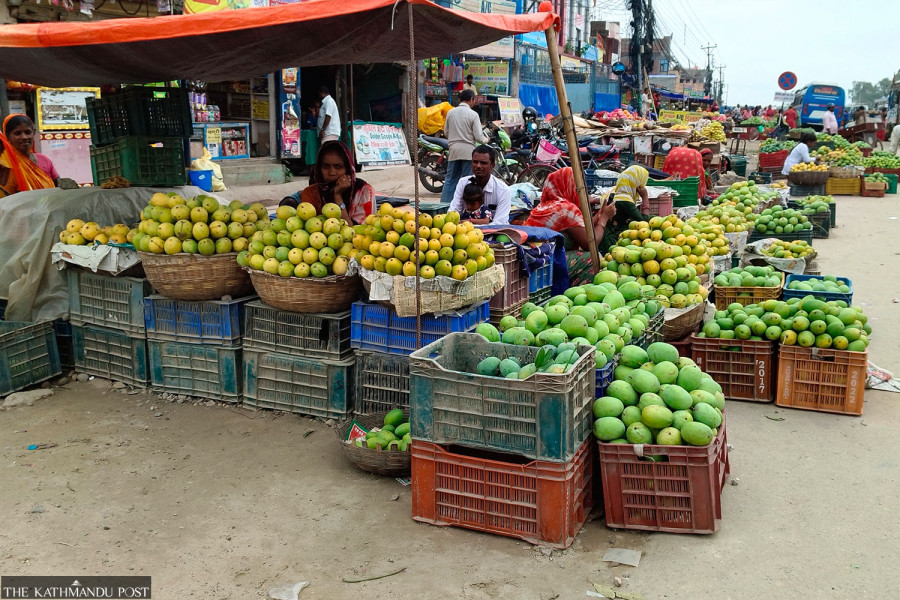Money
It’s Lahan mango, the brand that brings farmers a good price
Mango growers earned Rs10–20 per kg until two years ago. After branding, the farmgate price has reached Rs45–50.
Binay Aazad
Until a few years back, Shriwati Sada of Matiarwa, Lahan, in eastern Nepal sold her fruits at a throwaway price.
Tree-ripe, ready-to-eat mangoes from her orchard are now in high demand. She is also getting a reasonable rate. Thanks to Lahan Municipality, which has started branding and marketing of mangoes produced in Lahan.
“I get Rs45–50 per kg in the local market,” said Sada, who, a few years ago, would sell mangos at Rs10–20 per kg. She has a mango orchard measuring ten kattha.
Lahan’s mangoes taste good and are organic, Sada, 53, said. “So consumers are coming to the orchard to buy them.”
Mango has become the most sought-after fruit. While consumers visit the orchard to buy her produce, she also sells mangoes in the retail market. “I no longer rely on traders.”
Ram Kumar Yadav was found selling mangoes next to Sada at the local marketplace last Wednesday. He, too, was happy.
Yadav, 38, has a mango orchard on three bighas. He, however, sold mangoes of trees planted in two bighas to traders. “Even though I sold them to traders, I got a good rate.”
Yadav still has mangoes left on one bigha. He sells some of them in Lahan Bazaar as he gets a more reasonable rate there than what traders offer him.
Yadav calls his past experience of selling mangoes “painful”.
“Two years ago, we had a compulsion: to either sell mangoes cheaply to traders or let them rot. Sometimes it was hard even to get Rs5 per kg, which obviously was not enough to cover the cost of production. Our input is a lot but we never got a good return. This year, I am thrilled.”
Many other mango growers in Siraha villages are excited to get the actual value of their produce. Since last year, Lahan municipality has taken the initiative to promote the fruit.
The municipality has signed an agreement with Saraswati Agriculture Firm of Lahan, which does the grading, branding and packaging before the fruit is sent to the market. This has increased the local variety’s popularity.
Though not all the farmers have sold their mangoes to the municipality, the municipality's initiative has made Lahan’s mango the consumers' first choice, increasing the sale and price.
Bishal Luitel from Biratnagar went to Lahan to buy mangoes last week.
“I was not aware of the quality of Lahan’s mangoes. I learned about the brand through the media. So I came here to buy fresh mangoes.”
The agriculture firm has also opened a branch in Shantinagar, Kathmandu. The municipality has reached an agreement with the Aayo Pasal, an online app for the home delivery of Lahan’s mangoes across the country.
“Mango made Lahan popular. The mangoes have become a brand now,” said Badri Narayan Chaudhary, chairman of Lahan Municipality Ward 12. “The consumers are provided with organic mangoes. No harmful chemicals are used to grow and ripen the fruit,” he said.
Last year, the municipality sold 30 tonnes of mango and aims to sell 50 tonnes this year, said Chaudhary.
The popularity of the local mango is evident in increased sales and has encouraged farmers to grow their acreage. Mango saplings grown in Lahan nurseries sell like hot cakes.
“In the past, farmers were at the mercy of traders. Due to the lack of market, farmers were compelled to sell the fruit at a price offered by the traders,” said Shivaji Mahato, a nursery owner in Lahan, who mainly caters mango saplings. “Now, quality mangoes reach consumers directly.”
Farmers, however, said that the fruit is being sold at Rs100 per kg in Kathmandu, three times more than what they get.
They say the government should encourage farmers to grow the crop on a larger scale.
Ajay Kumar Mahato of Lahan Municipality Ward 2, who was selling mango in the Lahan market, said, “The price of mango has definitely increased, but we are still being cheated.”
“We get Rs40–45 per kg. In Kathmandu, the same product fetches Rs100. We do all the hard work, but other people reap benefits,” he said. “It would be a huge relief if the government arranged for farmers to sell mangoes in Kathmandu.”
Politicians in Lahan have sought a government policy to promote and market mango, considered the king of fruits.
“The effort of Lahan Municipality has created a local brand. Mango sales have increased in the district. This initiative should have come earlier,” said Ashok Kumar Sah, a local of Mirchaiya.
“Mango holds special significance to Madesh Province. It needs to be promoted and commercialised to substitute imports,” Sah said. “Moreover, we can brand the mango better and export it.”
Last year, Siraha district produced 8,895 tonnes of mangoes on 9,500 hectares. However, the Agriculture Knowledge Centre expects a decline in output this year.
“Some mango trees yield fruits every alternative year,” said Narendra Kumar Mahaseth, chief of the Agriculture Knowledge Centre, Siraha. “As a result, production keeps fluctuating.”




 10.12°C Kathmandu
10.12°C Kathmandu














